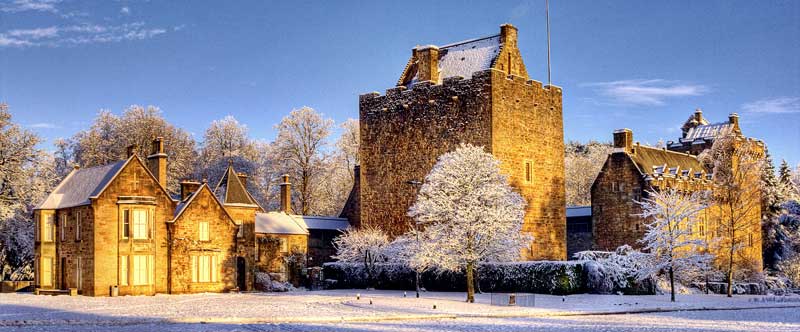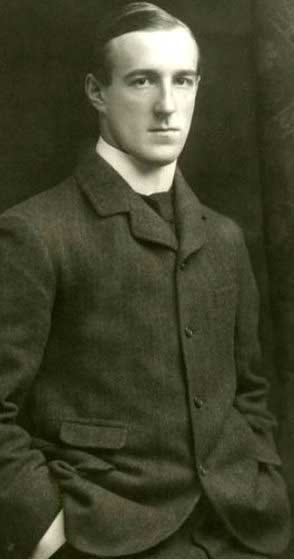
Further information has come to light on the movements of a piper we mentioned here last week. Scotland’s East Ayrshire Leisure is seeking sheet music of a tune composed by a Donald Galbraith so that it may be played at the opening of Dean Castle in Kilmarnock on the completion of a major redevelopment of the castle, once known as Kilmarnock Castle.
Galbraith’s composition is called Lord Howard de Walden’s Welcome to Dean Castle.
The information has been revealed after further research undertaken by East Ayrshire Leisure’s Dick Institute. Information on Donald Galbraith himself, however, remains scarce.
Our post last week included a contemporary newspaper of a report on a grand dinner held at the castle in 1910 on the restoration of the castle Keep. We now have two more reports from the 1910 Kilmarnock Standard that shed light on de Walden. It seems that the new “Lord of the Manor” also later proposed the toast of ‘The Immortal Memory’ at the Kilmarnock Burns Club’s annual Burns Supper in the George Hotel, then the following day opened the new Technical School as well as presenting prizes to a local Cadet Corps. The next day he inaugurated an artificial curling pond.
We include, below, a heavilty edited report of the Burns Supper because it mentions the elusive Donald Galbraith. Please contact us in the usual way if you can provide more information:
KILMARNOCK BURNS CLUB ANNUAL SUPPER
The Kilmarnock Burns Club on Tuesday evening celebrated the anniversary of the poet’s birth with the customary supper in the George Hotel. More than ordinary interest attached to the occasion from the fact Lord Howard de Walden had kindly consented to become the President and to propose the toast of the ‘Immortal Memory.’
The attendance was the largest in the history of the Club for many years, upwards of 200 gentlemen sitting down to supper, and the entire proceedings passed off with the greatest possible success. At the President’s table Lord Howard de Walden was supported by Mr Thomas Esson, Commissioner on the Estate; Mr James Middleton, factor; Sherrif Mackenzie; Colonel Cunningham of Caprington; Mr. R. J. Paton of Templetoun; Mr Hugh S. Dunn of Annanhill; Provost Gemmill, ex Provost Hood, ex Baillie, Matthew Smith, Mr D. McNaught (Kilmaurs), and Rev. Wm. Dunnet, M.A., V.D. and amongst other present were:
[long list of names – Editor]
… At the outset of the proceedings ex-Bailie Matthew Smith, the retiring President of the club said – I have the honour to move that Lord Howard de Walden take the chair. (Applause.) As a freeman of this good old town and as successor in the Kilmarnock estate to that noble friend and patron of Burns, the Earl of Glencairn, I think it is truly fitting that Lord Howard de Walden should be called upon to be the President of the Burns Club and the Chairman of this its annual meeting. (Applause.) A great poet has said that “some men are born great,” but Lord Howard de Walden has also achieved greatness in that republic of intellect where birth counts for nothing – (applause) – and I think we are warranted in believing that as a Scot by blood and name he will take pleasure and pride in adding a cairn to the Scottish Poet’s memory. (Applause.)
… The supper was then served, and the haggis “warm, reekin, rich,” was ushered in by Pipe Major Donald Galbraith and Piper MacKenzie amid great applause. After the cloth had been removed, the Chairman proposed “The King” and “The Queen, the Earl and Countess of Carrick, and other Members of the Royal Family,” which were heartily honoured. The croupier gave “the Imperial Forces” to which Colonel Cuninghamme replied.
The Chairman (Lord Howard de Walden), in rising to propose ‘The Immortal Memory of Robert Burns’ was received with loud and prolonged cheering. He said – When it falls to an outlander to propose the Immortal Memory of Robert Burns he cannot but feel a certain sinking at heart. He is invited at his own free will to step into a melee where the doughtiest champions of literature have long raged furiously together. (Laughter) His only chances of escape are to prove him well capable of holding his own in such company or to range him immediately on the strongest side and trust that his insignificance will preserve him from the attack of too powerful an adversary. (Laughter.) So with no great skill or experience in letters I am asked to make a lonely border raid into a turbulent region of letters, where I am little likely to find either honour or advancement. And yet I think my safety will lie in taking the chances of the field, for if I endeavour to evade danger by an easy eulogy I immediately challenge comparison with others of known merit, and should I in the present company venture a criticism I leave an unpleasant impression, if not risking my personal safety. (Laughter).
[de Walden goes on in a similar vein for a not inconsiderable length of time – Editor].
… So it might happen that the Immortal Memory is blinding us while some other of his nature is striving in the darkness. If so, May God the “giftie gie us” to see him as Burns would have done. Perhaps not quite as generously for he was sometimes overkind in his appreciation. All such in his succession unknown and unborn I would couple with this toast. For we must not let the great past become the great present. I do not want our Poet to turn in his grave. (Laughter.) When time brings the man who shall take up the tale of our years, and turn our lost labours to account. I should like to think that those who drink to his memory will in their hearts include something of those who cleared his field.

And so I look back with sympathy to the time when this voice was struggling for utterance to the great medley of ancient minstrels whose memory was not immortal. Their names were writ in water. None consumes a solitary haggis on their behalf, not even an occasional dram to their honour. (Laughter.) And yet some of them linger in our memories and many of them had great merit. Thomas the Rhymer, whose legend gave our literature one of its strangest stories; the Clerk of Tranent, Andrew Wyntoun; Barbour, perhaps the first man to write a pure style in the British tongue; Dunbar, who with true Scotch pride apologises in one of his poems for using southron words; Blind Harry, the maimed genius of a previous age; Gawin Douglas, and the great army of lost singers who built up the Border tradition. Let us remember the men whom your great singer has made possible, and the men also who made him possible, the stem that bore and the fruits that may be, as well as the great flower. And with these associations I ask you to drink to the Immortal Memory of Robert Burns.
The toast was pledged in solemn silence.



